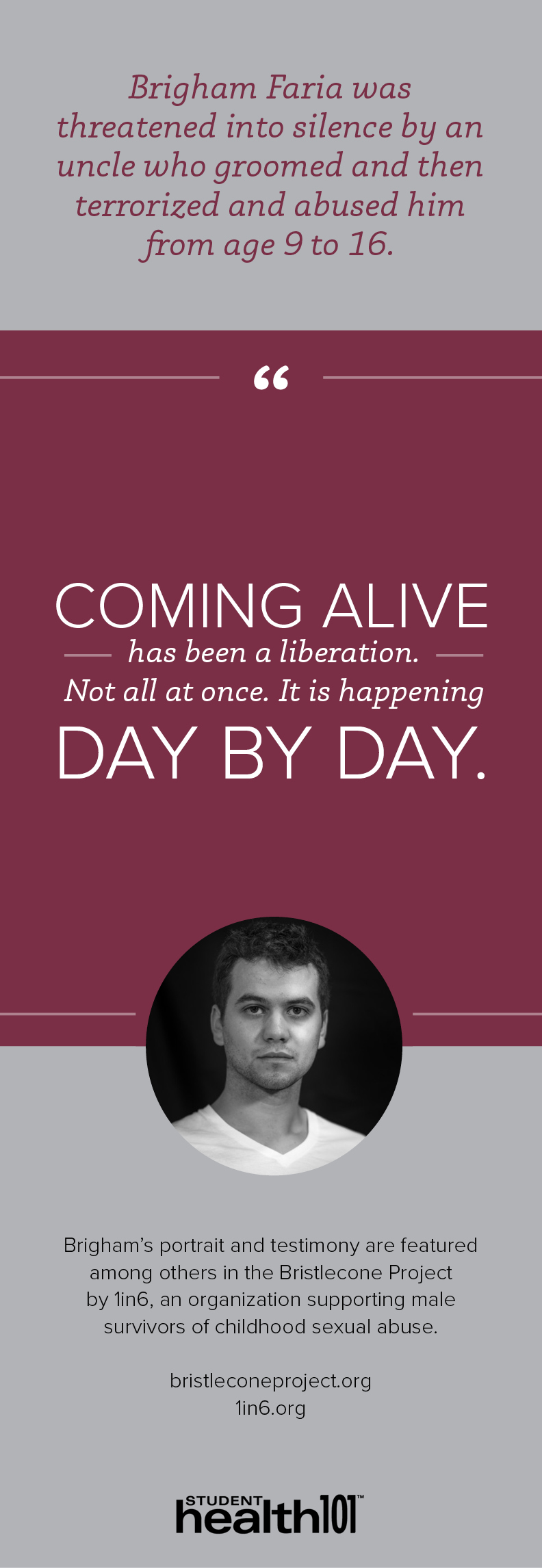What to do when your male friend is sexually assaulted

“I’ve only told a handful of people, none of them being a therapist or my family,” wrote a second-year undergraduate at Towson University, Maryland, in a recent Student Health 101 survey.
“It took me almost two years to come to terms with it, and I still feel like the few that I told sort of wrote it off because I’m a male,” said a second-year graduate student at the University of Kansas.
“I have been socialized my whole life to ‘be a man,’” said a third-year undergraduate at Ripon College, Wisconsin. “Men are told to just deal with it and not let it out.”
How social pressures and stereotypes harm men
Men who have had unwanted sexual experiences can experience many barriers to talking about those assaults. That’s why it’s so important that you, their friends and loved ones, know that you are well positioned to help—and how you can do that.
Many of the challenges men face reflect social pressure: ideas that sexual assault makes them less masculine, that women can’t assault men, or that “real men” don’t talk about (let alone get help for) painful experiences.
“Some men fear that they will be seen as less of a man,” says Dr. Jim Hopper, a researcher, therapist, and instructor at Harvard Medical School. “If they’re heterosexual, they may fear people will doubt their sexuality. And if they’re gay or bisexual, they may blame the assault on their sexuality in a way that further stigmatizes their being gay or bisexual.”
Stereotypes relating to another person’s identity should not determine how we try to support friends. “Sex, gender identity, and race can all influence how an experience like this affects someone, but it’s very important you have no presumption about what it feels like to your friend,” says Dr. Melanie Boyd, assistant dean of student affairs and lecturer in women, gender, and sexuality studies at Yale University, Connecticut.
1 in 6 boys and teens
One in six men in the US is sexually assaulted before age 18, according to studies from the 1980s to the early 2000s. In 2015, 7 percent of men reported being sexually assaulted while attending college in a 2015 study by the Washington Post and the Kaiser Family Foundation. Regardless of the targeted men’s sexual identity, the perpetrators of these assaults are men and women, according to the Centers for Disease Control and Prevention (2013).

4 steps to helping a friend
Everyone is different. People’s varying personalities and circumstances affect how they respond to an unwanted sexual experience and what we can do to help. For example, some people want lots of hugs, some people don’t. The most important thing is to relate to your friend in a way that can help him feel empowered and connected. You’re in a great position to do this.
1. Be careful not to “other” him
As challenging an experience as a sexual assault may be, it’s not as though your friend is an entirely different person. The “othering” of people who have been assaulted—treating them differently—can be just as dangerous as shrugging off unwanted sexual experiences, according to researchers Nicola Gavey and Johanna Schmidt (Violence Against Women, 2011). Avoid thinking of the assault as something that cuts survivors off from the rest of the world: In fact, it’s up to you to be supportive and counteract that.
2. Truly listen and ask questions
Make sure to listen and focus on your friend’s feelings. “Pay attention to their specific issues,” says Dr. Boyd.
- Avoid pushing your own ideas. “Allow them to talk without being interrupted, and especially don’t put any more pressure on them, e.g., telling them that you think they need the police or a therapist,” says the third-year undergraduate at Ripon College. “Ask what you can do to help.”
- Don’t be an investigator. It’s not important for you to find out exactly what happened or to delve into the details beyond what your friend wants to share.
3. Be thoughtful about your language
Language is important. Specifically tell him you are not bringing stereotypes into this.
- Avoid pronouns that assume the perpetrator is a man—or a woman.
- Make clear that you are not making presumptions about your friend’s experience based on his identity, whether he is straight or gay, transgender or cisgender (of typical gender). “Drop in phrases or words that don’t put them on the spot but that signal your openness to hearing a more complex narrative, about, for example, ‘people of all genders,’” says Dr. Boyd. “Pay attention to what is going on for the person in front of you.”
- It is not your role to define the experience for your friend. Some people don’t use the word “rape” or “assault” to describe what may seem to you to be sexual violence, or relate to “victim” or “survivor.” “You want them to feel like you’re connecting with their experience, not trying to impose your views or language on them,” says Dr. Hopper.
4. Give him choices
“As a friend, you want to relate to them in a way that gives them power, including by giving them choices and respecting whatever choices they make on whatever timeline,” says Dr. Hopper.
- Whether your friend wants to pursue some kind of action may depend in part on your school’s disciplinary policy or other systems for dealing with sexual misconduct. It is up to him to decide. While it is not your job to steer him to the police or school administrators, providing information can be a great way to help. Figure out what resources your school has, such as hotlines, therapists, heath care providers, disciplinary processes, or survivor advocates. Informing yourself is essential.
- Talk with your friend about what makes him feel empowered and safe. Everyone’s different, so whether your friend feels like watching TV, working out, or flirting with someone at a party, you should ask and see how you can help. Some people want to nest, some people want to be social. It’s not your job to judge but to be supportive.
Don’t say that, say this
Avoid saying this
- There’s no way I can understand what you’re going through.
- How could you let that happen?
- If someone tried to do that to me, I’d fight them off.
- You’re never going to be the same.
- You’re endangering other people if you don’t tell the police.
- Now that you’re a rape survivor, you have to speak out about your experience.
- You must not have come to terms with it yet.
Maybe try this
- It means a lot that you trusted me with that.
- What can I do to help?
- Do you think you’d like to talk to a crisis center or something like that?
- Don’t blame yourself.
- What would be an empowering/fun/etc. thing to do?
- I’m here for you.
Know any guitarists?
+ Check out the 1 Blue String campaign
 |







